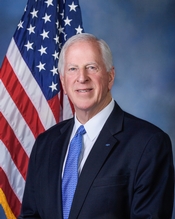Congressman Thompson can be found working hard in the halls of Congress … or in the rows of his vineyard. He recently won re-election, and next year will begin his 12th term in the U.S. House of Representatives, where he will continue to advocate vehemently for the wine community. Thompson serves California’s 5th Congressional District, including all of Napa and parts of Contra  Costa, Lake, Solano, and Sonoma Counties. The Congressman was born in the Napa Valley and continues to reside there with his family. He also owns a 20-acre vineyard in Lake County.
Costa, Lake, Solano, and Sonoma Counties. The Congressman was born in the Napa Valley and continues to reside there with his family. He also owns a 20-acre vineyard in Lake County.
Thompson, who is a member of the powerful House Ways and Means Committee, introduced and advanced a resolution recognizing the significance of the Napa Valley victory at the 1976 Paris Wine Tasting, and co-founded the bipartisan Congressional Wine Caucus. Today, the Caucus brings together 195 bipartisan, bicameral Members of Congress working on wine education and wine-related policy issues.
I had the pleasure of connecting with the Congressman by phone to discuss the recent perils facing his district. Winemaking always has an inherent risk, but 2020 has produced more challenges than ever anticipated, with fires early in the season and the COVID pandemic significantly impacting all wine industry facets, including restaurants and retailers. While fires are not new to the area, the Congressman explained that in previous years, the fires came late in the season when a limited amount of grapes were left on the vines. This year the fires came early, moving from a tragedy for some to an existential threat to the entire industry.
To address some of these hardships, Congress passed the Coronavirus Aid, Relief, and Economic Security (CARES) Act, which in part dedicated $9.5 billion in assistance to agricultural producers and an additional $14 billion in funding to the United States Department of Agriculture (USDA) to create an aid package for farmers who have seen a crash in commodity prices due to the COVID-19 pandemic. Building on the CARES Act, Congressman Thompson is leading the effort to reauthorize the Wildfire and Hurricane Indemnity Program-Plus (WHIP+) that provides disaster payments to producers to offset losses from hurricanes, wildfires, and other qualifying natural disasters. The funding is essential to support those who have experienced extreme devastation from the recent fires and the COVID pandemic.
On our call, the Congressman told stories of family-owned estates whose grapes will soon rot as wineries have backed out of purchase agreements, concerned that wildfire smoke has damaged the fruit. Without adequate research, growers and winemakers have few tools to prevent or rectify problems associated with smoke-damaged grapes. Numerous growers reported wineries not accepting grapes until laboratory tests were conducted to ascertain if smoke compounds were present. However, the few commercial labs serving the industry were extremely backlogged due to COVID plus the sheer extent of the fires – resulting in many broken contracts. In other instances, wineries elected not to harvest and produce a 2020 vintage, significantly impacting the immigrant workforce hired to harvest grapes. For immigrants who have lost their jobs or homes, the road to stability is incredibly steep, as many are ineligible for federal aid.
As fires and the correlating smoke taint remain an ongoing threat, the Congressman is laser-focused on several congressional initiatives to help the community rebuild. He hopes to expand smoke taint research funding through the USDA, develop fire science research/fire prevention work through tax code incentives, and find opportunities to support his district’s essential immigrant workforce. For all these efforts, he is working across the aisle and in coordination with members of Congress from other impacted wine-growing states like Washington and Oregon.
The Congressman has always played an outsized role, ensuring that grape growers, winemakers, and the wine workforce thrive. Now his advocacy role has grown further as he must react to crisis after crisis. Yet, despite what appears like an uphill battle, the Congressman noted that "the community is resilient and innovative." He also remarked about the significant philanthropic impact of efforts like Auction Napa Valley, which the Congressman volunteers for each year.
When I pressed the Congressman on how those outside the area could best help the beloved community recover and rebuild, he said, "drink more California wine!" I imagine that is an easy task for our WRO readers. So, please order from your favorite CA wineries and sign up for a virtual tasting –drinking a little wine can go a long way!
Beyond buying California wine and visiting the Napa and Sonoma region (which—I can attest after a recent visit—is still idyllic despite the recent fires), there are other ways to help, like donating to the Napa Valley Community Foundation. Finally, encourage your members of Congress to join the effort led by Congressman Thompson to support an extension of the Wildfire and Hurricane Indemnity Program Plus (WHIP+).
63
